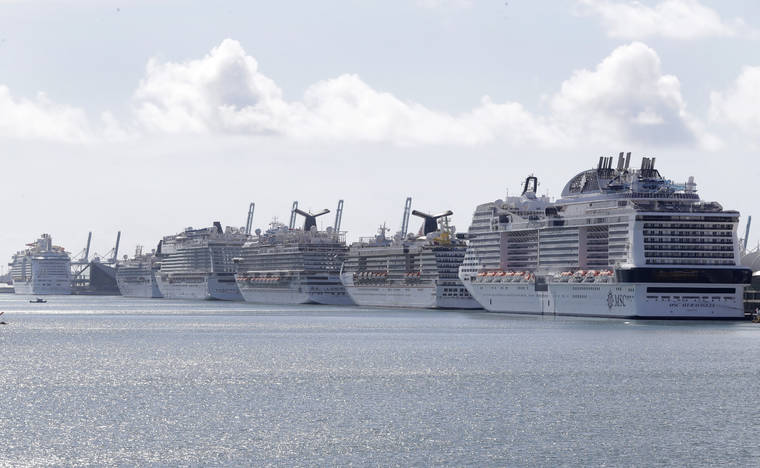FORT LAUDERDALE, Fla. — The U.S. Coast Guard has directed cruise ships to prepare to treat any sick passengers and crew on board while being sequestered “indefinitely” offshore during the coronavirus pandemic.
The new rules outlined in a memo are required for ships in the district that covers Florida, Georgia, South Carolina and Puerto Rico. They also come with a stiff warning: Any foreign-flagged vessels “that loiter beyond U.S. territorial seas” should try first to medically evacuate the very sick to those countries instead.
Many South Florida cruise ships are registered in the Bahamas, where hospital capacity is limited and people are still recovering from last year’s devastating Hurricane Dorian.
The rules, which apply to vessels carrying more than 50 people, were issued in a March 29 safety bulletin signed by Coast Guard Rear Admiral E.C. Jones, head of the seventh district. All ships destined for U.S. ports were already required to provide daily updates on their coronavirus caseload or face civil penalties or criminal prosecution.
Dozens of cruise ships are either lined up at Port Miami and Port Everglades or waiting offshore due to the coronavirus pandemic. Most have only crew aboard, but Carnival Corp., which owns nine cruise lines with a total of 105 ships, notified the SEC on Tuesday that it has more than 6,000 passengers still at sea.
Federal, state and local officials have been negotiating over whether Carnival’s Holland America cruise ships, the Zaandam and Rotterdam, would be allowed to dock at Port Everglades this week. But the company’s Coral Princess is coming, too, with what that ship’s medical center called a higher-than-normal number of people with flu-like symptoms.
Carnival said three of the 40 ships that were at sea when it paused its cruises last month are expected to arrive at port by week’s end. In addition to the ships arriving in Fort Lauderdale, other ships are approaching Civitavecchia, Italy, and Southampton, England, spokesman Roger Frizzell said.
Two of four deaths on the Zaandam were blamed on COVID-19 and nine people have tested positive for the novel coronavirus, Carnival’s maritime chief officer William Burke told Broward County commissioners at a Tuesday meeting. The company said at least 190 have reported symptoms. More than 300 Americans are on Zaandam and Rotterdam.
Gov. Ron DeSantis said he expected a resolution Wednesday after speaking with President Donald Trump, but port authorities later said discussions between the company and officials over the terms of docking were ongoing and they did not expect to update Broward County commissioners on Wednesday as it was foreseen at the Tuesday meeting.
DeSantis maintained Florida’s health care system is stretched too thin to take on the ships’ coronavirus caseload, but he said he would accept the 49 Florida residents on board.
“My concern is simply that we have worked so hard to make sure we have adequate hospital beds,” he said.
Trump had expressed sympathy toward the passengers on Tuesday.
“They’re dying on the ship,” Trump said. “I’m going to do what’s right. Not only for us, but for humanity.”
Passengers expressed their frustrations to The Associated Press on Wednesday.
Andrea Anderson and her husband Rob coughed their way through a video chat from the Zandaam. Asked what she would say to Florida’s governor, Anderson said, “How would he feel if his mother was on this ship? Would he still be saying, ‘No they can’t dock?’”
Mary Beth Van Horn said she’s “terrified” for her brother Tom Brazier, 77, of Ocean Park, Washington, who went on the South American cruise with his wife before he was supposed to begin a new bone cancer treatment in April. They weren’t allowed to transfer to the Rotterdam with other apparently healthy people because they have portable CPAP machines and other mobility problems.
“He is afraid. Last time, he told me ‘I just don’t see how this could end well,’” she said.
For most people, the virus causes a fever and cough that can clear up in two to three weeks without hospitalization. Older adults and people with existing health problems are more likely to suffer severe illness and require oxygen to stay alive.
Under normal conditions, a ship can call on the Coast Guard to medically evacuate people too sick to be cared for on board.
Now a Coast Guard flight surgeon in the seventh district will decide if a transfer is absolutely necessary, but the cruise companies then would be responsible for arranging on-shore transportation and hospital beds.
“This is necessary as shore-side medical facilities may reach full capacity and lose the ability to accept and effectively treat additional critically-ill patients,” the memo said.
——— Associated Press contributors include Kelli Kennedy in Fort Lauderdale and Julie Walker in New York City; Gomez Licon reported from Miami.
———
Follow AP coverage of the virus outbreak at https://apnews.com/VirusOutbreak and https://apnews.com/UnderstandingtheOutbreak.


